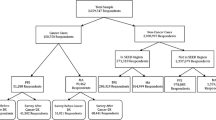Abstract
Purpose
Electronic health records (EHR) and data warehouses contain large amounts of data that hold promise for understanding and improving population health management. Utilizing the Health Data Compass (HDC) warehouse, a comprehensive and novel database of adult Coloradans who have completed curative-intent cancer treatment within a health care system was created. By analyzing patient demographics and health care utilization among this group, gaps in and barriers to coordinated care post-active cancer treatment may be identified and better understood.
Methods
A survivorship database (HDC-SD) was built from the Health Data Compass (HDC) warehouse by identifying individuals with histories of cancer who received treatment summary care plans (TSCPs) through the University of Colorado Cancer Center (UCCC) between January 1, 2020, and December 31, 2021. Patient sociodemographic characteristics, disease characteristics, and health maintenance were described and compared between urban and rural settings using chi-square tests.
Results
The HDC-SD includes 1933 records representing 13 categories of cancers. The majority live in an urban setting (89.8%). Patients in HDC-SD living in urban areas had higher rates of completing recommended colorectal screening, mammography, Prostate-Specific Antigen (PSA) tests, flu shots, and COVID-19 vaccination. Additionally, emergency department visits occurred at a statistically significant higher level for those living in urban areas.
Conclusions
Creating and analyzing a comprehensive database of individuals who have completed active cancer treatment may highlight gaps in care within complex health care systems. Engaging different stakeholders to address these issues may help improve and enhance systematic population management for cancer survivors.
Implications for Cancer Survivors
Completed treatment summary care plans may be used to increase the completion of individual health maintenance recommendations and potentially population health maintenance recommendations.


Similar content being viewed by others
Data availability
The data sets generated during and/or analyzed during the current study are available from the corresponding author on reasonable request.
References
Siegel RL, Miller KD, Sandeep Wagle N, Jemal A. Cancer statistics, 2023. CA Cancer J Clin. 2023;73:17–48. https://doi.org/10.3322/caac.21763.
Bluethmann SM, Mariotto AB, Rowland JH. Anticipating the "silver tsunami": prevalence trajectories and comorbidity burden among older cancer survivors in the United States. Cancer Epidemiol, Biomarkers Prev. 2016;25(7):1029–36. https://doi.org/10.1158/1055-9965.EPI-16-0133.
Colorado Central Cancer Registry. Colorado Department of Public Health & Environment. https://cdphe.colorado.gov/center-for-health-and-environmental-data/registries-and-vital-statistics/colorado-central-cancer. Accessed 19 April 2023.
Murphy CC, Gerber DE, Pruitt SL. Prevalence of prior cancer among persons newly diagnosed with cancer: an initial report from the Surveillance, Epidemiology, and End Results Program. JAMA Oncol. 2018;4(6):832–6. https://doi.org/10.1001/jamaoncol.2017.3605.
Grassi L, Spiegel D, Riba M. Advancing psychosocial care in cancer patients. F1000Res. 2017;4(6):2083. https://doi.org/10.12688/f1000research.11902.1.
Hoekstra RA, Heins MJ, Korevaar JC. Health care needs of cancer survivors in general practice: a systematic review. BMC Family Practice. 2014;15(94):1–6. https://doi.org/10.1186/1471-2296-15-94.
Risendal B, Westfall JM, Zittleman L, Hodgson C, Garrington T, High Plains Research Network Advisory Council, Sutter C, Jarrell L, Le Blanc W, Overholser L. Impact of cancer survivorship care training on rural primary care practice teams: a mixed methods approach. J Canc Educ. 2022;37:71–80. https://doi.org/10.1007/s13187-020-01788-0.
How to improve. Institute for Healthcare Improvement. https://www.ihi.org/resources/Pages/HowtoImprove/default.aspx. Accessed 10 April 2023.
Urban influence codes. USDA Economic Research Service. https://www.ers.usda.gov/data-products/urban-influence-codes/. Accessed 10 April 2023.
Coloado: 2020 Census. US Census Bureau. https://www.census.gov/library/stories/state-by-state/colorado-population-change-between-census-decade.html. Accessed 10 April 2023.
Survivorship Version 1.2023. National Comprehensive Cancer Network. https://www.nccn.org/professionals/physician_gls/pdf/survivorship.pdf. Accessed 9/11/2023.
Acknowledgements
The authors gratefully acknowledge Santi Das, MA, and Michelle Edelmann, PhD, for their sustained contributions to these efforts.
Funding
This work was supported by Paul R. O’Hara Seed Grant Funds. The University of Colorado Cancer Center Population Health Shared Resource and Elizabeth Molina Kuna are supported by NCI grant P30CA046934. This work was also supported by the Health Data Compass Data Warehouse project (healthdatacompass.org) and the Colorado All Payer Claims Database (https://civhc.org/get-data/co-apcd-info/).
Author information
Authors and Affiliations
Contributions
All authors contributed to the study conception and design. Material preparation, data collection, and analysis were performed by CC, EMK, and LO. The first draft of the manuscript was written by CC and EMK. All authors commented on previous versions of the manuscript. All authors read and approved the final manuscript.
Corresponding author
Ethics declarations
Conflict of interest
The authors declare that they have no conflict of interest.
Ethics approval
This project was approved for exemption through the Colorado Multiple Institutional Review Board of the University of Colorado.
Additional information
Publisher’s note
Springer Nature remains neutral with regard to jurisdictional claims in published maps and institutional affiliations.
Rights and permissions
Springer Nature or its licensor (e.g. a society or other partner) holds exclusive rights to this article under a publishing agreement with the author(s) or other rightsholder(s); author self-archiving of the accepted manuscript version of this article is solely governed by the terms of such publishing agreement and applicable law.
About this article
Cite this article
Callaway, C., Kuna, E.M. & Overholser, L. Development of a novel cancer survivorship database to describe health care utilization patterns for Coloradans who have completed primary cancer treatment. J Cancer Surviv (2023). https://doi.org/10.1007/s11764-023-01506-x
Received:
Accepted:
Published:
DOI: https://doi.org/10.1007/s11764-023-01506-x




